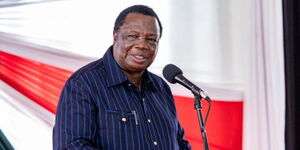The Kenya Airports Authority (KAA) has dismissed recent social media claims that taxi operators and travel agents are operating in restricted areas at Jomo Kenyatta International Airport (JKIA). This includes meeting passengers just after they disembark from aircraft, before they undergo passport control.
In a statement released on Tuesday, KAA categorically denied the allegations, terming them false and misleading. The authority maintained that such reports do not reflect the operational protocols observed at JKIA or any other airport under its management.
“The Kenya Airports Authority (KAA) wishes to address recent social media reports and public concerns regarding claims that travel agents and taxi drivers are operating beyond authorized areas, including meeting passengers just outside aircraft before passport control at Jomo Kenyatta International Airport (JKIA). We categorically state that these reports are untrue and do not reflect the operational protocols in place at JKIA or any other airport under our management,” the statement read.
KAA further explained that strict security and access control measures are enforced at all airports in line with international aviation safety standards.
These measures are anchored in protocols set by the International Civil Aviation Organization (ICAO) and the Kenya Civil Aviation Authority (KCAA), ensuring that only authorised personnel can access sensitive areas.
“KAA maintains strict security and access control measures under international aviation standards, including those set by the International Civil Aviation Organization (ICAO) and the Kenya Civil Aviation Authority (KCAA),” the agency affirmed.
The authority clarified that access to restricted areas such as airside zones, immigration halls, and baggage claim is limited to vetted and accredited staff.
Commercial service providers, including taxi operators and travel agents, are not permitted to access these sections unless under very specific, pre-authorised circumstances.
According to legal guidelines, any individual or entity found violating these access controls could face disciplinary action, including suspension of access passes and possible prosecution under aviation and security laws.
KAA reassured passengers of its ongoing commitment to upholding high standards of safety, efficiency, and security at all airports across the country.
“No unauthorized personnel, including travel agents or taxi drivers, are permitted beyond designated airport areas. Access to these restricted areas is tightly regulated, requiring valid security credentials and adherence to the Airport Security Programs,” the authority emphasised.
The agency added that these measures are not only in line with global aviation protocols but are also critical in protecting the privacy, safety, and smooth processing of passengers. KAA indicated that any breach of these regulations compromises airport operations.
Kenya is currently faced with an infrastructural challenge at the largest airport, JKIA, with the government racing against time to get an investment partner to expand the airport to accommodate more facilities.
Last year, the government had set its sights on securing a deal with a private investor to undertake the infrastructural changes. However, this was dealt a blow after President William Ruto was forced to cancel engagements with the Adani Group following uproar.












